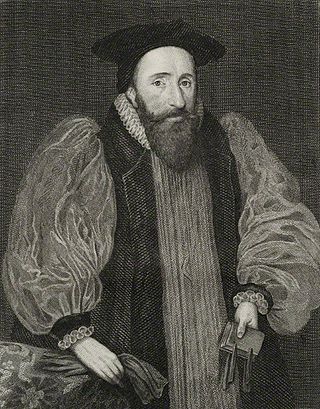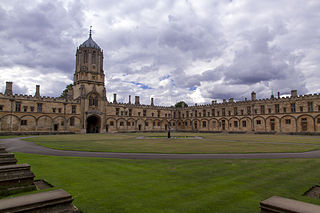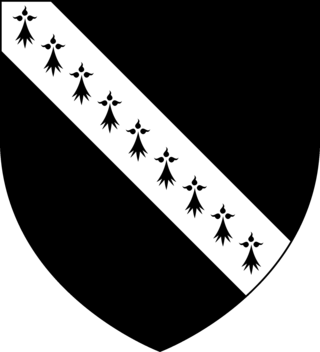Related Research Articles

John Potter was Archbishop of Canterbury (1737–1747).

Sir John Cheke (or Cheek) (16 June 1514 – 13 September 1557) was an English classical scholar and statesman. One of the foremost teachers of his age, and the first Regius Professor of Greek at the University of Cambridge, he played a great part in the revival of Greek learning in England. He was tutor to Prince Edward, the future King Edward VI, and also sometimes to Princess Elizabeth. Of strongly Reformist sympathy in religious affairs, his public career as provost of King's College, Cambridge, Member of Parliament and briefly as Secretary of State during King Edward's reign was brought to a close by the accession of Queen Mary in 1553. He went into voluntary exile abroad, at first under royal licence (which he overstayed). He was captured and imprisoned in 1556, and recanted his faith to avoid death by burning. He died not long afterward, reportedly regretting his decision.

John Bridgeman was an English Anglican clergyman.
John Saltmarsh was an English religious radical, "One of the most gentle tongued of controversialists", writer and preacher. He supported the Covenant and was chaplain in Thomas Fairfax's army. The Dictionary of National Biography describes his theology as "Calvinistic in its base, but improved by practical knowledge of men". William Haller called him that strange genius, part poet and part whirling dervish. He preached Free Grace theology, and published on the topics of Peace, Love and Unity.

The siege of Oxford comprised the English Civil War military campaigns waged to besiege the Royalist controlled city of Oxford, involving three short engagements over twenty-five months, which ended with a Parliamentarian victory in June 1646.
Mathew Roydon was an English poet associated with the School of Night group of poets and writers.
Henry Parker (1604–1652) was an English barrister and political writer in the Parliamentarian cause.
Sir George Sondes, 1st Earl of Feversham KB was an English politician who sat in the House of Commons at various times between 1626 and 1676 and was then created a peer and member of the House of Lords.
William Clagett (1646–1688) was an English clergyman, known as a controversialist.

John Hall (1627–1656), also known as John Hall of Durham, was an English poet, essayist and pamphleteer of the Commonwealth period. After a short period of adulation at university, he became a writer in the Parliamentary cause and Hartlib Circle member.
James Wright (1643–1713), was an antiquary and writer, author of a county history of Rutland (1684), and the Historia Histrionica (1699), an account of theatre in England in the seventeenth century.
Thomas Wright (1561–1624) was an English recusant and early emotion theorist. Wright is known for his work The Passions of the Minde in generall. Wright is a possible candidate for the priest Ben Jonson referenced during the trials for the Gunpowder Plot.
Robert of Cricklade was a medieval English writer and prior of St Frideswide's Priory in Oxford. He was a native of Cricklade and taught before becoming a cleric. He wrote several theological works as well as a lost biography of Thomas Becket, the murdered Archbishop of Canterbury.
Martin Lluelyn (1616–1682) was a poet and physician of probable Welsh ancestry.
Basil Kennett was a Church of England cleric who served as the first chaplain to the British Factory at Leghorn. An academic, writer and translator, Kennett was elected president of Corpus Christi College, Oxford, serving for a short time before his early death. His 1696 Romæ Antiquæ Notitia, or the Antiquities of Rome was considered the subject's standard handbook for a century.
Sir Peter Pett was an English lawyer and author.
Thomas Gibson, (1647–1722) was an English physician and anatomist.
Thomas Potts was an English law clerk, and the author of the Discoverie of Witches.

Sir John Philipot was an English merchant and alderman of London. He was a member of the Grocers' Company, served as MP for London in 1371 and 1381, headed the opposition to John of Gaunt during the minority of Richard II, was appointed joint-treasurer for the war with France in 1377 at the request of the Commons, was Lord Mayor of London in 1378, and assisted Richard II during the Peasants' Revolt of 1381. Philpot Lane in London is named for him.

George Tooke (1595–1675) was an English soldier and writer. He took part in the unsuccessful expedition under Sir Edward Cecil against Cadiz in 1628, and wrote an account of the undertaking, The History of Cales Parsion, 1652, in prose and verse. Tooke returned from the expedition in poor health, and was compelled to retire from the military service. He resided on his estate of Popes, in Hertfordshire, and was intimate with Selden and Hales. He was the author also of The Legend of Brita-mart, 1646, and other works.